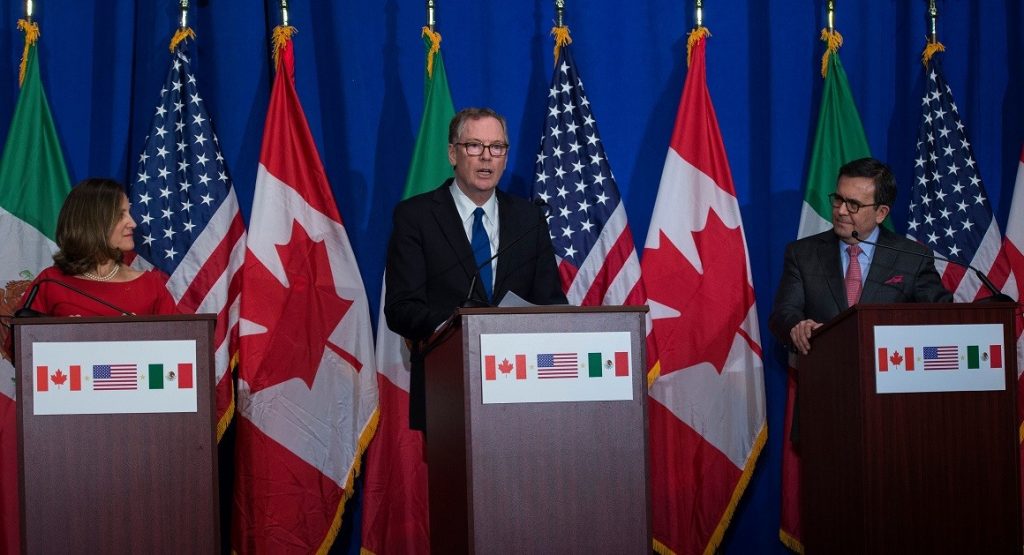Ellis offered his analysis during a Monday interview on SiriusXM’s Breitbart News Tonight with Breitbart News’s Senior Editors-at-Large Rebecca Mansour and Joel Pollak.
[Robert Kraychik | January 16, 2018 | Breitbart]
NAFTA prohibits the Canadian, Mexican, and American governments from prioritizing domestic suppliers for government procurement. This regulation, said Ellis, offers comparative advantage to Mexico and Canada over America given their comparatively smaller government expenditure totals.
President Donald Trump, added Ellis, is seeking reciprocity between Canada, Mexico, and America in the realm of government procurement regulations:
[The Trump administration wants to reign] in the government procurement rules so that we will open our government market to foreign vendors to the exact dollar amount that Canada and Mexico open up their government procurement accounts to our companies. So in other words, we have “buy American” rules for the American government, but under NAFTA, we’ve included Canadian and Mexican companies as American, so Canadian and Mexican companies can be treated as American companies when taxpayer dollars are spent on goods and services. We happen to spend $1 trillion, or so, whereas the Mexican government only spends $100 billion. So we’re going to make that equal.
Trump intends to implement “a five-year sunset on NAFTA where it gets renegotiated every five years, the way any business contract does,” added Ellis, citing “well-placed sources.”
NAFTA’s rules of origin need recalibration to further incentivize domestic manufacturing, said Ellis: “[The Trump administration wants to renegotiate] the rules of origin so that 50 percent of a car made in Mexico, 50 percent of the components must be made in the United States if it’s going to receive favorable tax and tariff treatment when it comes into the U.S.”
Describing NAFTA’s dispute resolution and arbitration mechanisms as amounting to “NAFTA courts” and “unelected foreign tribunals,” Ellis called for reassertion of American sovereignty: “We want to put an end to them and make them optional,” describing them as effectively subverting American law under the status quo.
“The Mexicans are starting to come around and they realize that they have more to lose than the United States does, and that actually they can benefit by coming to the table and negotiating,” said Ellis.
Subscription to free trade must not be dogmatic, suggested Ellis, framing international free trade within certain industries as compromising America’s national security interests. He pointed to Section 232 of 1962’s Trade Expansion Act as affording the president an avenue to protect such industries he described as vital to the national interest; as the law“authorizes the Secretary of Commerce to conduct comprehensive investigations to determine the effects of imports of any article on the national security of the United States.”
China is globally dumping steel and aluminum to undercut American producers of the two metals, said Ellis: “Right now, China is dumping vast amounts of steel and aluminum on the world market, and it is driving our steel and aluminum producers into bankruptcy, and under this 232 law, we can impose tariffs on those products in order to protect and defend our domestic steel and aluminum industries.”
Last Thursday saw the submission of a report from the Department of Commerce regarding the impact of steel imports on national security. Via the Department of Commerce: Today Secretary of Commerce Wilbur Ross formally submitted to President Donald J. Trump the results of the Department’s investigation into the effect of steel mill product imports on U.S. national security. After this submission, by law, the President has 90 days to decide on any potential action based on the findings of the investigation. After the President’s decision is announced, the Department will publish a summary of the report in the Federal Register and make the report available to the public after removing any business confidential or classified material.
NAFTA has facilitated domestic consolidation of agricultural businesses while damaging smaller farming operations, said Ellis: “What it is is the war between being and small. More than 200,000 small family farms have been lost just since the NAFTA years. Because what you’re seeing is consolidation among the large grain traders: Archer Daniels Midland, Cargill, the big grain traders have more power and the smaller farmers and the smaller producers are being hammered.”
“Farmers have taken it in the neck from NAFTA,” added Ellis. “Everybody thinks of America as the bread basket of the world, and great exporters food; we are actually a net importer of food. And since NAFTA, what was once a $2.5 billion surplus in farm exports has turned into a $6.4 billion deficit. We are importing more food; tomatoes, potatoes; cucumbers; onions; sheep, and beef. We are importing more of that from the NAFTA countries than we are exporting to them.”













